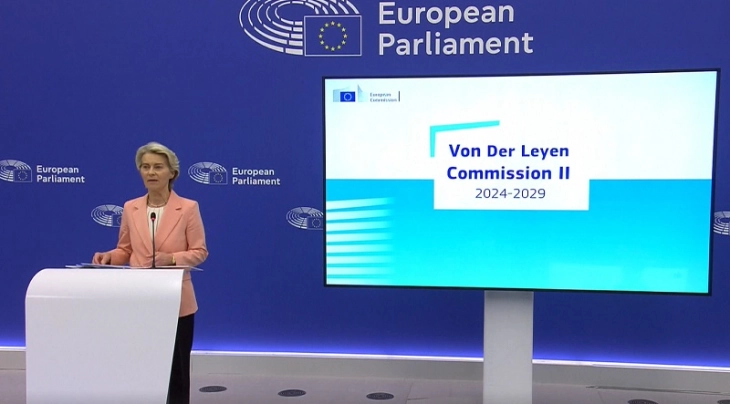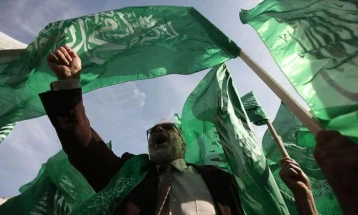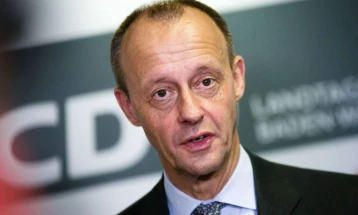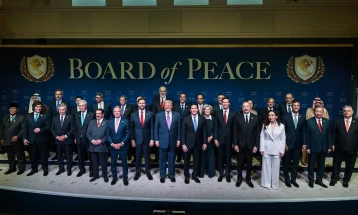Von der Leyen unveils EU top jobs with focus on economy, security
- European Commission President Ursula von der Leyen unveiled her proposed new leadership team on Tuesday, with top jobs for France and Italy and a dual focus on economic and security issues.

Strasbourg, 17 September 2024 (dpa/MIA) - European Commission President Ursula von der Leyen unveiled her proposed new leadership team on Tuesday, with top jobs for France and Italy and a dual focus on economic and security issues.
The assembly of the European Union's executive leadership team - a delicate exercise balancing geography, political allegiance and gender - comes as the bloc faces deep challenges including Russia's war on Ukraine and competitive backsliding against the United States and China.
The focus on security and the EU's lagging competitiveness for von der Leyen's next five-year term "reflects a lot the time we live in," she told the European Parliament in Strasbourg, France.
"Last time, the topic of global warming was absolutely top," said von der Leyen, who was first appointed commission president in 2019. "The dominance of the topic is still there," she added, mentioning recent devastating floods and wildfires.
"But this time, for example, the topic of security triggered by the Russian war in Ukraine, but also the topic of competitiveness has much more impact" on the organization of her team, von der Leyen said.
The German conservative politician presented her long-awaited commission picks to EU lawmakers after weeks of wrangling with member states over names and portfolios. The nominations are subject to the approval of EU lawmakers.
The commission proposes and enforces legislation for the bloc's almost 450 million inhabitants and employs around 32,000 people.
The Italian (top) Job
Von der Leyen nominated six vice-presidents and 20 commissioners - one from each EU member state besides her native Germany.
She controversially nominated far-right Italian politician Raffaele Fitto to be a vice president in the EU executive arm, a precedent likely to encounter resistance in the EU legislature.
Fitto, a member of Prime Minister Giorgia Meloni's Brothers of Italy (FdI) party, is to hold the cohesion and reforms portfolio. As vice president, he would oversee several other commission portfolios.
If confirmed, it would be the first time a politician from the FdI has held a commissioner post. Fitto is currently Italy's Minister for EU Affairs and was previously minister for cohesion under former centre-right prime minister Silvio Berlusconi.
Meloni did not back von der Leyen for a second commission term, however the German conservative needed to consider the risk of Italy drifting further to the right in opposition to the EU, as Hungary has done.
Explaining her decision, von der Leyen said it reflected the fact that "Italy is a very important country and one of our founding members."
"Italy is finally a key player in Europe again," Meloni said in Rome, welcoming the nomination.
Resistance to the anticipated news had been voiced in recent days from various factions who see him as emblematic of a dangerous rightward shift in Europe.
But others in Brussels dismiss that view, describing Fitto as more of a moderate and, above all, pro-European.
To secure his appointment, Fitto - along with all other nominees - will need to pass a hearing in the EU legislature and later a vote alongside von der Leyen's other choices.
French drama and Slovenia hold-up
The commission formation was delayed by a domestic political row in Slovenia about their candidate and was overshadowed on Monday by the surprise resignation of France's commissioner Thierry Breton.
The incumbent EU internal market commissioner wrote in a barbed letter posted on X that von der Leyen had asked Paris to replace him with a different candidate, in exchange for "an allegedly more influential portfolio for France."
Breton, who had publicly criticized von der Leyen's leadership during this year's European Parliament elections, wrote that this "political trade-off" had been made "for personal reasons" that she never discussed directly with him.
This was "further testimony to questionable governance" in the commission, he added.
Stéphane Séjourné, the outgoing French foreign minister, was put forward by Paris at the last minute after Breton's abrupt resignation.
Von der Leyen nominated Séjourné executive vice president in charge of the industrial strategy portfolio, a policy area prioritized by France.
Gender balance struggle
Complicating matters further was von der Leyen's request for EU capitals to nominate both a man and a woman for the commission roles in pursuit of gender parity among her 26 commissioners.
Despite her repeated urging, only nine commissioners and vice presidents will be female.
Von der Leyen said the original nominations from EU countries were "completely unacceptable," with 22% of the candidates female and 78% male.
The commission president said she subsequently worked with EU states to improve the share to 40% women and 60% men.
Alongside Fitto and Séjourné, there will be four women among the six vice-presidents - Teresa Ribera from Spain, Finland's Henna Virkkunen, Romanian Roxana Mînzatu and former Estonian prime minister Kaja Kallas.
Kallas had previously been selected as the bloc's new foreign policy chief.
A new European defence commissioner has also been set up for the first time, with a focus on the bloc's defence industry. Von der Leyen nominated Lithuania's Andrius Kubilius to the role.
Despite the ongoing political row in Slovenia, Marta Kos was nominated for critical role of enlargement commissioner, with new EU candidates including Ukraine trying to join the bloc.







